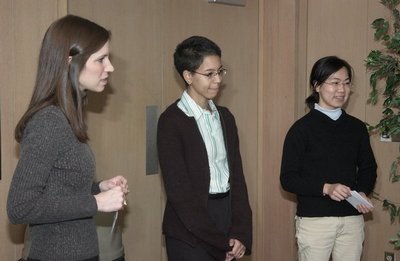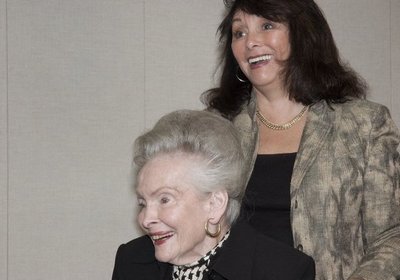May 31, 2007
2007-08 Magnuson Scholars announced: Current scholars at work on array of projects
Six graduate students, one from each UW health sciences school, have been named as Magnuson Scholars for the 2007-08 academic year. Each of the students will receive approximately $25,000 to support graduate studies and research.
The newly named scholars are Dr. Ayman Al Dayeh from the School of Dentistry, Cecelia Beckwith from the School of Nursing, Phillip Hochwalt from the School of Medicine, Seunghye Hong from the School of Social Work, Dr. Richard A. Jensen from the School of Public Health and Community Medicine and D. Eldon Spackman from the School of Pharmacy.
The late Senator Warren G. Magnuson, in whose name the program was established, was committed to improving the nation’s health through biomedical research and was instrumental in establishing the National Institutes of Health, Medicare and Medicaid during his long career in the U.S. Senate.
The scholars program is part of the Warren G. Magnuson Institute for Biomedical Research and Health Professional Training, established in 1991 in honor of the late senator. Funds to establish the Institute came from two grants totaling nearly $5 million from the U.S. Department of Education, from the State of Washington and from more than $550,000 in donated funds.
The income from the endowment is used for research about diabetes and other diseases, to support students in graduate or postgraduate health professions training programs, and to fund the Warren and Jermaine Magnuson chair in Medicine for Neurosciences, held by Dr. Bruce Ransom, chair of the Department of Neurology.
The Magnuson Scholars are selected on the basis of their academic performance and their potential contributions to research in the health sciences.
The six Magnuson Scholars who were selected for the 2006-07 academic year are working on their projects as they pursue their individual goals.
The current Magnuson Scholars and their projects:
Derek Fletcher, School of Medicine — Now a senior medical student, Fletcher spent a year pursuing research on wound healing and the problems of chronic ulcers that cannot be healed. Such chronic sores, which are one of the complications of diabetes, can become so severe that amputation is necessary. In fact, Fletcher’s interest in the problem was sparked by his interaction with a Polynesian man in his 30s who developed a foot ulcer that eventually required amputation of his leg below the knee.
Fletcher hopes to become a plastic surgeon and pursue a career in academic medicine, in part because he enjoys both teaching and research. He is also interested in caring for patients in an underserved community, an interest that developed as a result of his experiences at Harborview Medical Center. He loves the Northwest and has enjoyed rock climbing, snow skiing, fly fishing, cycling, running and endurance equestrian events. He has also been a water skiing instructor.
Chong-suk Han, School of Social Work — Han grew up in San Francisco and earned a bachelor’s degree from the University of California , Berkeley, and then a master’s degree in sociology at University of California at Irvine.
He is working on his dissertation for a Ph.D. and is using the Magnuson Scholar funds for a small-scale pilot study to explore issues related to his dissertation work on HIV/AIDS prevention with gay Asian men in America. He worked on an empowerment project with Asian Pacific gay men in Seattle before entering the UW Ph.D. program, and he has also worked as a writer and journalist, including a stint as editor in chief of the International Examiner, a pan-Asian paper based in Seattle.
Rebecca Hubbard, School of Public Health and Community Medicine — Hubbard, a doctoral student in the Department of Biostatistics, is conducting research on models of chronic disease progression with a focus on predicting quality of life according to a person’s own values.
She is a graduate of the University of Pittsburgh who earned a master’s degree in epidemiology from the University of Edinburgh and a master’s degree in applied statistics at Oxford University. She also carried out field research in Panama on natural forest regeneration. She hopes to develop new statistical methods for health research that will help people make realistic choices about treatments and care. In her spare time, she rows with the Union Bay Rowing Club and plays violin with a local string quartet.
Elizabeth James, School of Pharmacy — A Texan who graduated from Texas A&M and then earned a Pharm.D. degree from the University of Texas, James came to the UW as a graduate student in the Pharmaceutical Outcomes Research and Policy Program. She has worked on a project investigating the effects of pharmacy benefit changes on outcomes for people with chronic diseases.
Overall, her interests are in patient and health-care provider education related to efficient use of medications, especially for chronic diseases such as diabetes. She hopes to pursue this work after earning her graduate degree.
Gulrosebegum Jiwani, School of Nursing — Jiwani, a doctoral student in nursing science, was born in Tanzania and immigrated to Canada in 1978 with her family. She earned a bachelor’s degree in nursing from the University of Windsor, Ontario, and a master’s degree from Memorial University of Newfoundland. For several years she has been a nursing consultant on addictions for the British Columbia Ministry of Health.
She is interested in developing an evidence-based decision-making model to guide policies for people with addictions. In many ways, she hopes that her work will help to bridge the gap between research findings and public health policy, especially for marginalized populations. She does community volunteer work and enjoys time with her dog and cat.
Dr. Ching-Yi (Emily) Wu, School of Dentistry — Wu was born in Taiwan, where her parents and brothers still live, and earned her dental degree from National Yang-Ming University in 2001. Two years later she moved to Seattle to begin work on a Ph.D. in oral biology at the UW. She worked with bacteria that cause gum disease when she was a dental student. As an intern, she worked with patients who had developed dry mouth as a result of radiation therapy.
Her interest in the natural antibiotic role of proteins in the saliva grew, and she is now studying secretions from salivary gland cells for her Ph.D. thesis. She is also interested in teaching, and in introducing dental students to the importance of research to improve treatment.




